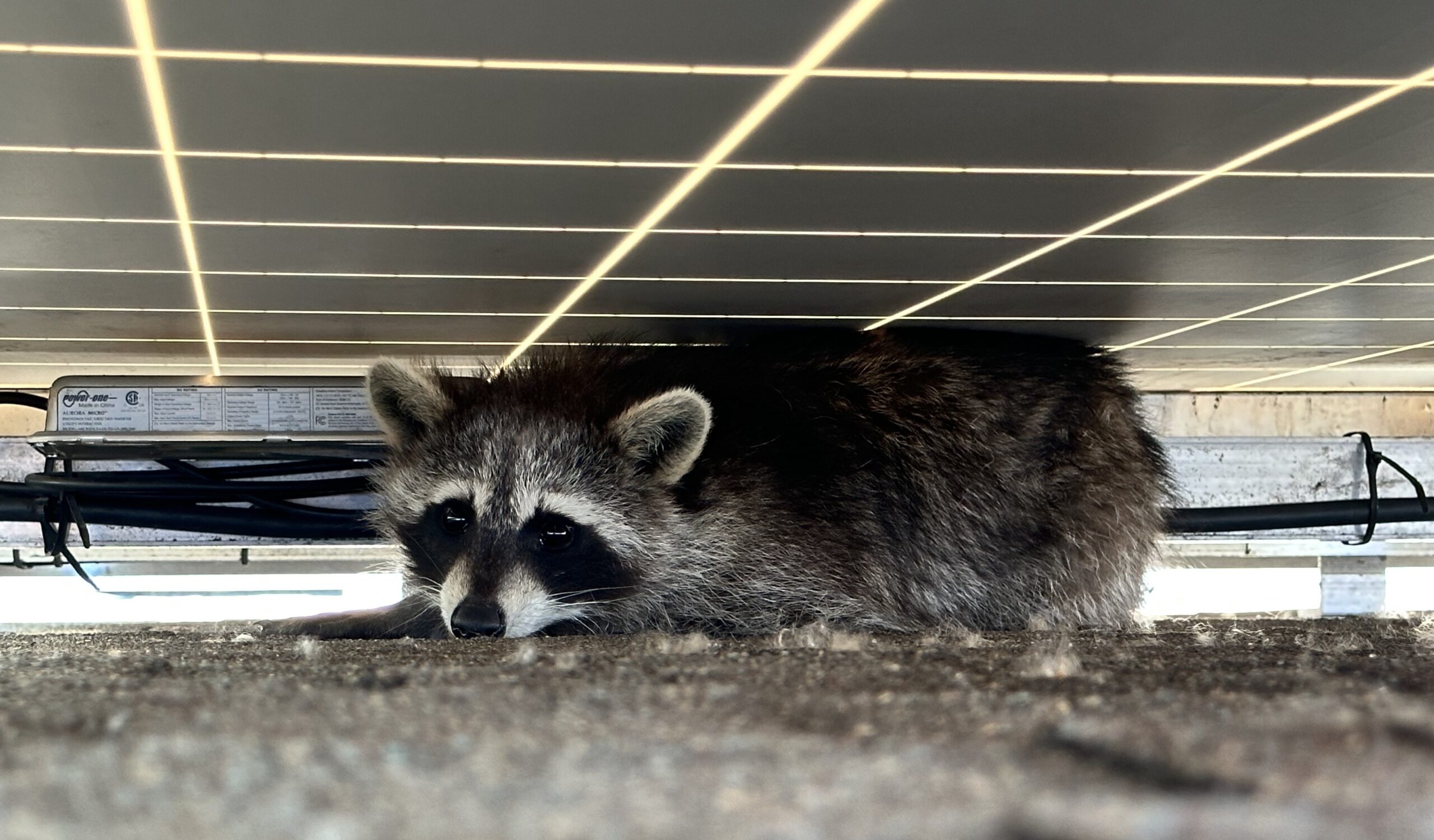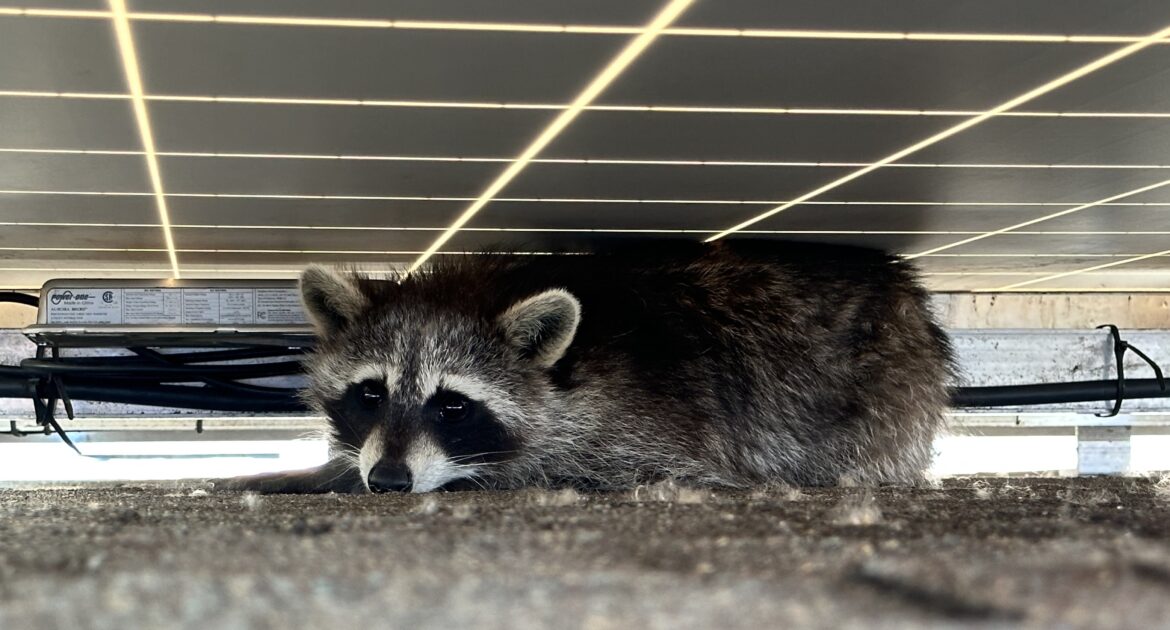When winter approaches, wildlife in Toronto begins to prepare for the cold months ahead. Raccoons, in particular, are known for their clever strategies to survive the harsh conditions. Contrary to popular belief, raccoons do not hibernate in winter. Instead, they go through a period of reduced activity, relying on the fat they stored during the warmer months.
These intelligent creatures will seek out sheltered areas to stay warm, such as attics. This is why understanding how to deter raccoons is crucial for homeowners. By securing trash bins, closing potential entry points, and using humane deterrents, you can prevent raccoons from taking refuge in your property.
If you’re a homeowner, understanding how raccoons prepare for winter can help you manage their presence around your house. In this blog post, we’ll explore the habits and activities of raccoons as the colder months approach, and why partnering with Skedaddle for wildlife removal is your best option.
Highly Adaptable Animals
Raccoons are highly adaptable mammals that reside in many urban and suburban areas, including Toronto. These nocturnal animals are known for their intelligence and dexterity. With winter approaching, raccoons become even more active in preparing for the cold months ahead. They do not hibernate like some animals. Instead, they enter a state called torpor, which is a lighter form of dormancy. Understanding this behaviour is crucial for homeowners who may find raccoons seeking shelter in their attics, garages, or under decks.
During late summer and early fall, raccoons will start to eat more, increasing their body fat to prepare for winter. This extra fat provides them with the energy needed to survive when food becomes scarce. In addition to eating more, raccoons also begin searching for warm and safe places to stay during the winter. They look for quiet, dark, and enclosed areas, making attics and basements perfect spots.
Raccoons are also known for their problem-solving abilities, which are particularly useful when locating and securing a winter den. They often choose locations that are close to a food source and safe from predators. In urban environments, this might include chimneys, attics, or even inside walls. To gain access to these areas, raccoons can use their dexterous paws to manipulate latches, open doors, and navigate tight spaces.
As winter progresses, raccoons in torpor will venture out occasionally to scavenge for food, especially during warmer days. They mostly remain inactive, thereby conserving energy. However, if they feel threatened or their den site becomes unsuitable, raccoons will not hesitate to relocate to a new, safer spot. Being nocturnal, their activities often go unnoticed by homeowners until signs such as noise, droppings, or damage appear.
For this reason, understanding raccoon behaviour during winter is essential for effective wildlife management. Taking proactive steps to secure potential entry points and eliminate attractants can go a long way in preventing these clever creatures from making your home their winter refuge. Partnering with professional wildlife removal services like Skedaddle ensures that any raccoon issues are handled humanely and efficiently, keeping both your home and local wildlife safe.
Do Raccoons Hibernate In Winter?
Contrary to popular belief, raccoons do not hibernate in winter. Instead, they enter a state of torpor where their metabolic rate slows down. During this period, raccoons will sleep for extended periods and reduce their activity to conserve energy. They will still wake up occasionally to search for food, but their movements are significantly reduced compared to other seasons. This behaviour helps them survive the harsh winter months without needing to hibernate fully.
Torpor allows raccoons to adapt to changing conditions, such as fluctuating temperatures and food availability. When the weather becomes milder, they may become more active temporarily. This pattern of intermittent activity can lead to raccoons becoming a nuisance for homeowners, particularly if they have taken shelter in or around the house. Understanding that raccoons do not hibernate can help homeowners remain vigilant and take preventive measures.
How To Deter Raccoons And Avoid Potential Damage
Preventing raccoons from settling near your home is crucial for avoiding potential damage and disturbances. One of the most effective ways to deter raccoons is by securing your property and removing any attractions. Start by ensuring that garbage bins are tightly sealed and that pet food is not left outside overnight. Raccoons are opportunistic feeders and will readily explore easy food sources.
Keep in mind that raccoons are excellent climbers and can access your roof through overhanging branches or downspouts. Trimming tree branches that are close to your home can help prevent raccoons from gaining access to your roof and attic. Additionally, securing vents, chimneys, and any other potential entry points can make your home less appealing to raccoons seeking shelter.
Investing in motion-activated lights or sprinklers can also be an effective deterrent. Raccoons prefer to move under the cover of darkness and may be discouraged by sudden lights or water bursts. However, if you already suspect raccoons have taken up residence in your home, it’s essential to contact a professional wildlife removal service like Skedaddle to handle the situation safely and humanely.
Wildlife In Toronto
Toronto is home to a diverse range of wildlife, including raccoons, squirrels, and skunks. These animals have adapted well to urban environments, often finding food and shelter in residential areas. While it can be enjoyable to observe wildlife from a distance, issues arise when these animals enter homes and cause damage. Raccoons, in particular, are known for their ability to open doors, latches, and containers, making them particularly challenging to keep out.
Urban wildlife, such as raccoons, plays a critical role in the ecosystem by controlling pest populations and cleaning up organic waste. However, when their presence conflicts with human habitation, it can lead to problems such as structural damage and health risks due to droppings and parasites. Homeowners in Toronto need to be aware of the wildlife around them and take proactive steps to protect their property.
Skedaddle specializes in humane wildlife removal, ensuring that animals like raccoons are safely and efficiently removed from homes without causing harm. Our methods focus on exclusion, which means sealing entry points to prevent future infestations while allowing the animals to exit on their own.
Why Choose Skedaddle For Wildlife Removal
Choosing the right wildlife removal service is crucial for ensuring the safety and well-being of both your family and the animals involved. Skedaddle stands out as the best choice for several reasons. Firstly, our team of experts is trained to handle a variety of wildlife situations with professionalism and care. We understand the behaviours and needs of raccoons and other animals, allowing us to implement effective and humane solutions.
Our humane exclusion methods ensure that raccoons are not trapped or relocated but are instead encouraged to leave your home naturally. This approach minimizes stress for the animals and reduces the risk of injury or death. Additionally, by sealing entry points, we prevent future infestations, providing long-term peace of mind for homeowners.
Skedaddle also offers a comprehensive assessment of your property to identify potential vulnerabilities and provide recommendations for making your home less attractive to wildlife. Our commitment to humane and effective wildlife removal has made us a trusted name in the industry, ensuring that our clients receive the best possible service.
Humane and Effective Solutions
Understanding how raccoons prepare for winter can help homeowners take proactive steps to protect their homes from these intelligent and adaptable creatures. While raccoons do not hibernate, their behaviour changes significantly during the colder months, leading them to seek shelter in warm and safe locations. By securing your property and removing potential attractions, you can deter raccoons and other wildlife from making your home their winter refuge.
However, if you find yourself dealing with a raccoon infestation, it’s essential to contact a professional wildlife removal service like Skedaddle. Our expert team uses humane and effective methods to ensure that raccoons are safely removed and prevented from returning. Don’t wait until the problem escalates—reach out to Skedaddle today and protect your home from unwanted wildlife.




